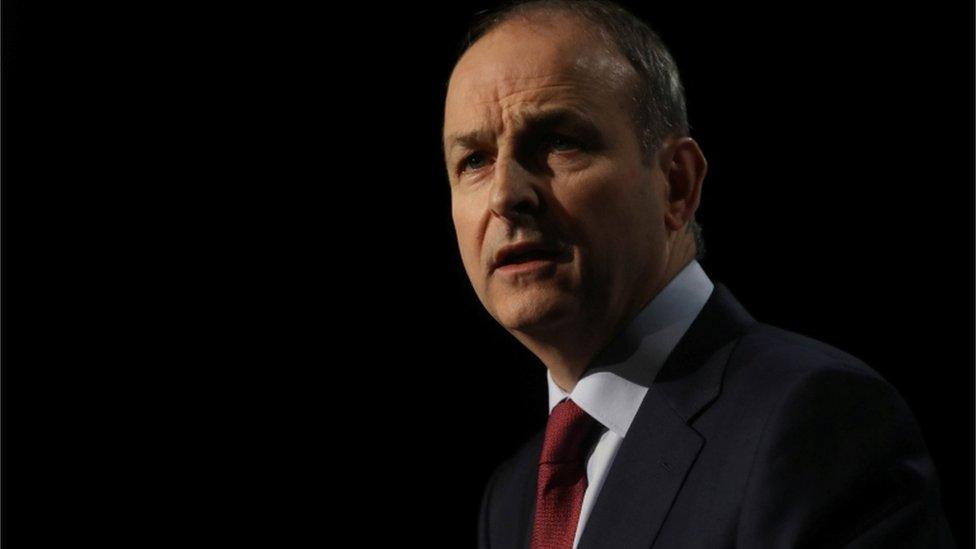Bessborough: Plan to build at mother and baby home site refused
- Published
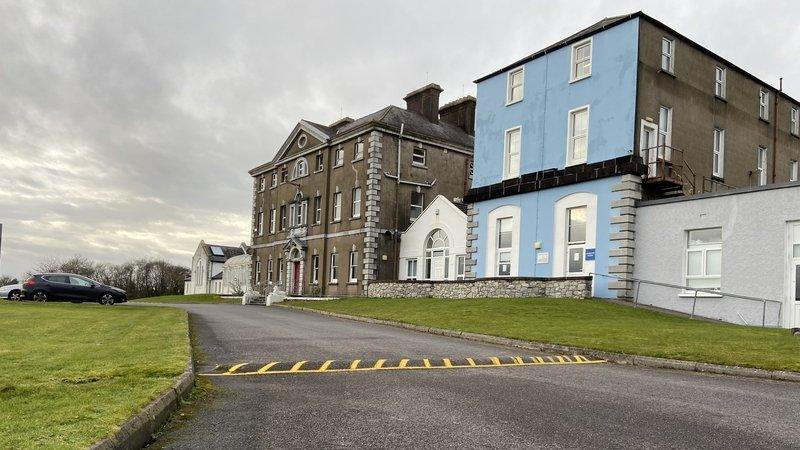
Bessborough House in Cork was a mother and baby home until 1998
Planning permission to build apartment blocks at the site of a former Irish mother and baby home has been refused, due to concerns over the possibility of unmarked infant graves in the area.
Developers wanted to build 179 flats in the grounds of the former Bessborough mother and baby home in County Cork.
Ex-residents and campaigners objected to the plans, fearing it could encroach on burial sites yet to be found.
More than 900 children from Bessborough died, but only 64 have known graves.
Bessborough mother and baby home operated from 1922 until 1998 and was one of a network of institutions which housed single mothers and babies during an era when most women were ostracised for becoming pregnant outside marriage.
Many of the institutions had high infant mortality due to harsh living conditions, which included overcrowding, malnutrition and poor infection control.
A six-year state inquiry into Irish mother and baby homes, external concluded that a total of 923 children who spent time in Bessborough died during its time in operation.
However, despite "very extensive inquiries and searches" the Mother and Baby Homes Commission of Investigation was "able to establish the burial place of only 64 children".
'Reasonable concerns'
The decision to refuse permission for the controversial housing development was made by An Bord Pleanála (the Planning Board).
Outlining its reasons for refusal, external, it said it was "not satisfied that the site was not previously used as, and does not contain, a children's burial ground".
It added there were "reasonable concerns in relation to the potential for a children's burial ground within the site, associated with the former use of the lands as a mother and baby home over the period 1922-1998".
It concluded it would be "premature to grant permission for the proposed development, prior to establishing if there is a children's burial ground located within the site".
'Marked, preserved and protected'
The decision was welcomed "with caution" by the Cork Survivors and Support Alliance, which was among those who objected to the planning application.
The group includes former Bessborough resident Catherine Coffey O'Brien, who was taken into the home as a pregnant 17-year-old in the 1980s.
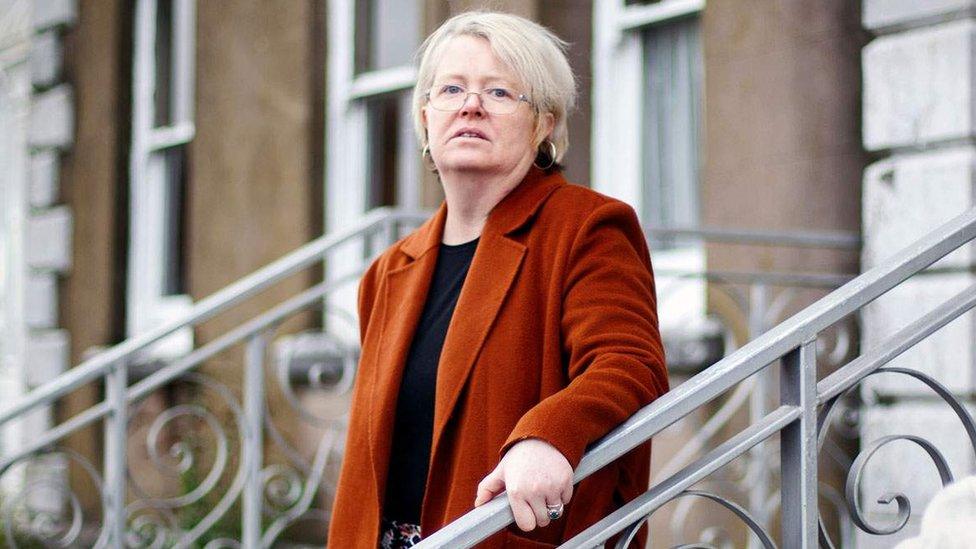
Catherine Coffey O'Brien pictured outside Bessborough in 2019
She was admitted to the home on the instructions of a social worker, but said she felt "tricked" into the arrangement.
She later ran away and managed to raise her child herself.
"I got to keep my baby, but others didn't," she told BBC News NI.
"We want the children's burial ground to be marked, preserved and protected."
Ms Coffey O'Brien travelled to the site on Wednesday, along with the group's researcher, Maureen Considine, to "pay respects" to all the women and children who died at the home.
Ms Considine said that in refusing the application, planners had "listened to people who historically have not been listened to".
However, the group still fears for the future of the site and wants the government to step in to buy it.
"We are concerned by the possibility that a commercial developer may be authorised to carry out investigations which should be the responsibility of the state," the alliance said in a statement.
"We appeal to those in power to step in and use compulsory purchase order legislation to protect and respect the children's burial ground at Bessborough."
Allow X content?
This article contains content provided by X. We ask for your permission before anything is loaded, as they may be using cookies and other technologies. You may want to read X’s cookie policy, external and privacy policy, external before accepting. To view this content choose ‘accept and continue’.

The group opposes exhumations and wants an area marked as a "children's burial ground" on a 1940s map to be left undisturbed.
Their position is in contrast to campaigners from the Tuam mother and baby home in County Galway, where some families want a full excavation to identify all those buried there.
However, Ms Considine points out the Tuam babies were buried in a disused septic tank, which is not the case at Bessborough, where her members have "come to terms" with the unmarked graves.
'No evidence of burials'
The firm behind the development, MWB Two Limited, said it was "disappointed" with An Bord Pleanála's refusal to grant planning permission at its 3.7 acre site.
In a statement, it said "experts in the areas of archaeological conservation and heritage found no evidence to suggest that its proposed development site contains any undocumented burials associated with the former mother and baby home".
"Furthermore, MWB Two Ltd believes that the identification of a burial ground on its land, based on a single interpretation of old Ordnance Survey Ireland records, is erroneous."
During oral hearings last month, external, MWB Two Ltd offered to pay for "appropriate memorialisation" of former residents at the site.
The firm added it would be "happy to conduct further site investigation" in order to allay any concerns about unmarked graves.
However, Ms Considine said campaigners were concerned about a potential "conflict of interest", adding a commercial developer was not the appropriate organisation to conduct such an investigation.

A brief history of Bessborough
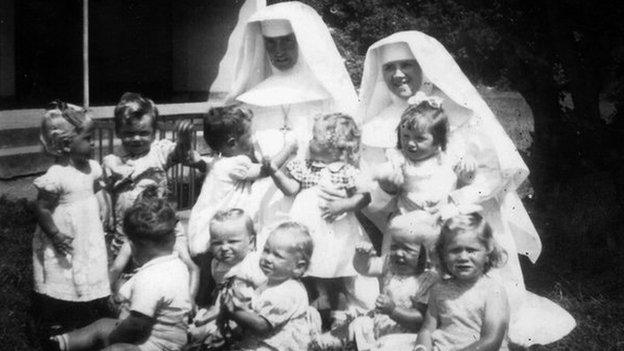
More than 900 children who spent time in the Bessborough home died of various causes
Bessborough mother and baby home was owned and managed by Catholic nuns from the Congregation of the Sacred Hearts of Jesus and Mary.
It was based in a large Georgian house which initially stood in a 200-acre estate off Bessboro Road in Cork.
The home opened in 1922 and over 76 years, it housed 9,768 women and 8,938 children, with the help of state funding.
It quickly became overcrowded - by 1934 it had the highest recorded infant mortality rate among all of Ireland's mother and baby homes, according to the Mother and Baby Homes Commission of Investigation.
During 1943, three out of every four children born in Bessborough died - a mortality rate of 75%.
In its 2019 interim report, which focused on burial practices, the commission of investigation said: "It is not known where the vast majority of the children who died in Bessborough are buried."
The report said the Congregation of the Sacred Hearts of Jesus and Mary did not record children's burials in any of its three mother and baby homes - Bessborough, Castlepollard and Sean Ross.
"The commission finds it very difficult to understand that no member of the congregation was able to say where the children who died in Bessborough are buried," the 2019 report added.
In a statement, external after the final report in January, the congregation said: "We are distressed and saddened that it is so difficult to prove with legal certainty where many of these infants were buried, especially with regard to Bessborough."

Related topics
- Published16 February 2021
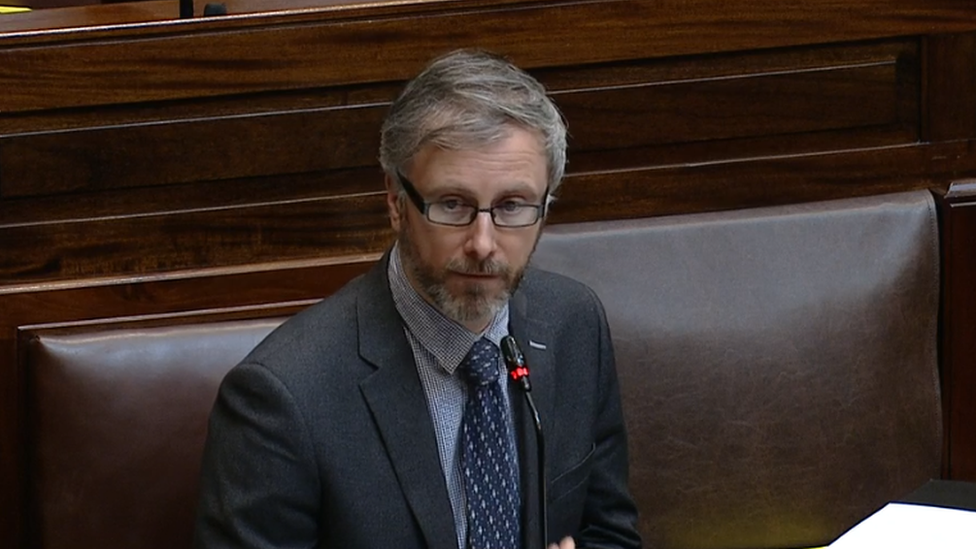
- Published13 January 2021
